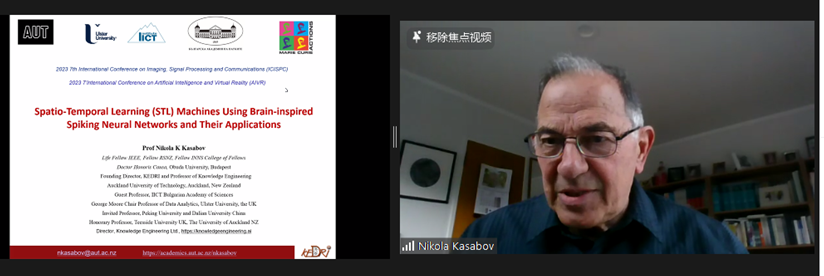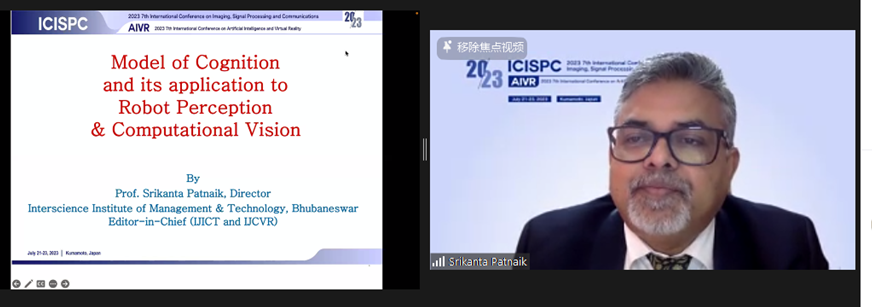ICISPC 2023
ICISPC 2023 conference
ICISPC 2023 conference was held in Kumamoto, Japan during July 21-23, 2023.
We acknowledge the invaluable assistance of the keynote speakers, the International advisory committee, the program committee members and session chairs.

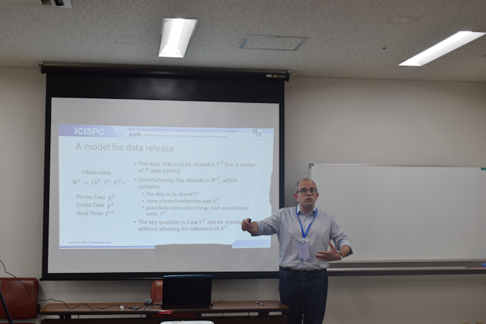
|
|
|
|
|
|

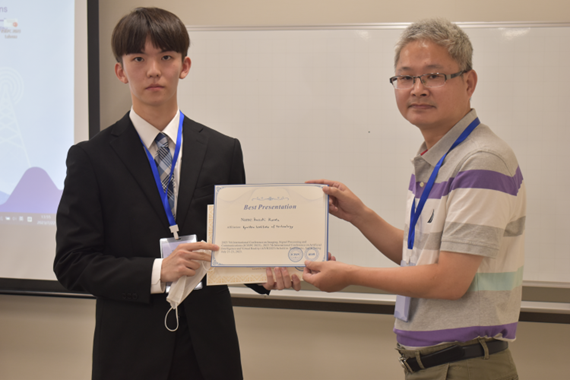
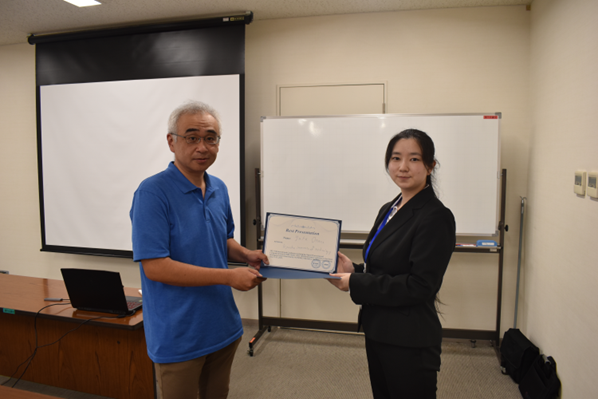


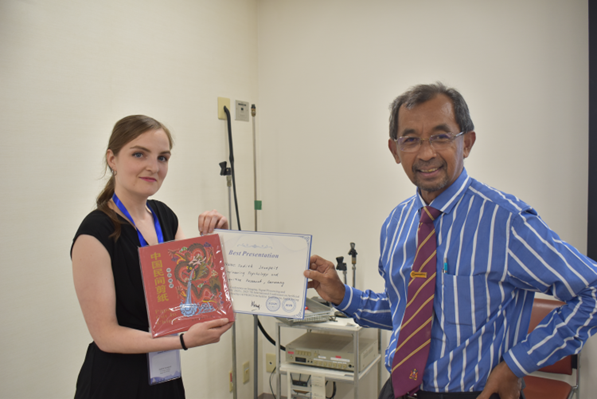



Technical
Session 1: Artificial Intelligence and
Hybrid Reality (Onsite)
JY014: Kazuki Kurata, Kyushu Institute
of Technology, Japan
Hardware Development of Sphere
Intersection in Ray-casting Using
High-Level-Synthesis
Technical Session 2: Image, Video
Analysis and Processing (Onsite)
JY015: Yuka Otani, Kyushu Institute of
Technology, Japan
Data Path Parallelization to Improve
Performance of High-level Synthesized
Sprite Drawing Hardware
Technical Session 3: Virtual Environment
and Virtual Reality Technology (Onsite)
JY2021: Judith Josupeit, Engineering
Psychology and Applied Cognitive
Research, TU Dresden, Germany
Inside the Black Box: Modeling a
Cybersickness Dose Value Through
Built-In Sensors of Head-Mounted
Displays
Technical Session 4: Data Visualization
and Interaction System Based on
Artificial Intelligence (Online)
JY2017: Sophie Dewil, Stevens Institute
of Technology, USA
Neural responses to altered visual
feedback in computerized interfaces
driven by force or motion control
Technical Session 5: Communication
System and Signal Processing (Online)
JY008: Sophie Adama, Leipzig University,
Germany
Evaluating the DoC-Forest tool for
Classifying the State of Consciousness
in a Completely Locked-In Syndrome
Patient
Technical Session 6: Modern Image
Detection and Processing
JY2047: Ariel Larey, Huawei Research,
Israel
Facial Expression Re-targeting from a
Single Character
Speakers of ICISPC2023

Prof. Nikola
Kasabov
IEEE Fellow, INNS Fellow and RSNZ Fellow
Auckland University of
Technology, New Zealand
IICT, Bulgarian Academy of Sciences, Bulgaria
ISRC, University of Ulster, the UK
Speech Title: Spatio-Temporal Learning (STL) machines using brain-inspired spiking neural networks and their applications
Abstract:The majority of
data, that are dealt with across information and data sciences, are
temporal or spatio/spectro temporal, including: biological and brain
signals; audio-visual; environmental; financial and economic;
communication. In many cases this data is simplified just as temporal or
spatial, due to lack of computational models to model both spatial and
temporal components of the data in their dynamic interaction and
integration.
The talk introduces a new type of learning methods and systems, called
spatio-temporal learning (STL). These are evolvable and explainable
learning systems that are structured according to the spatial or other
relationship information of temporal data and are trained to evolve
their structure by learning spatio-temporal associations of the data,
that are explainable. Inspired by the STL in the human brain, the talk
presents a STL machine NeuCube, based on spiking neural networks. It
demonstrates its applications for STL of biological and brain signals,
audio-visual data, environmental data such as seismic sensory data,
financial and economic data such as stock and trades, communication data
such as using VR. When compared to traditional machine learning
techniques on the same data, including deep neural networks, the STL
machines demonstrate significantly better accuracy and a clear
interpretability and explainability of the data in their dynamics over
time (Reference).
Reference: Kasabov, N., Time-Space, Spiking Neural Networks and
Brain-Inspired Artificial Intelligence, Springer Nature (2019) 750p., https://www.springer.com/gp/book/9783662577134
Biography:
Professor Nikola Kasabov is Life Fellow of IEEE, Fellow of the Royal
Society of New Zealand, Fellow of the INNS College of Fellows, DVF of
the Royal Academy of Engineering UK. He is the Founding Director of the
Knowledge Engineering and Discovery Research Institute (KEDRI), Auckland
and Professor at the School of Engineering, Computing and Mathematical
Sciences at Auckland University of Technology, New Zealand. Kasabov is
the 2019 President of the Asia Pacific Neural Network Society(APNNS) and
Past President of the International Neural Network Society (INNS). He is
member of several technical committees of IEEE Computational
Intelligence Society and Distinguished Lecturer of IEEE (2012-2014). He
is Editor of Springer Handbook of Bio-Neuroinformatics, Springer Series
of Bio-and Neuro-systems and Springer journal Evolving Systems. He is
Associate Editor of several journals, including Neural Networks, IEEE
TrNN, Tr CDS, Information Sciences, Applied Soft Computing. Kasabov
holds MSc and PhD from TU Sofia, Bulgaria. His main research interests
are in the areas of neural networks, intelligent information systems,
soft computing, bioinformatics, neuroinformatics. He has published more
than 620 publications highly cited internationally. He has extensive
academic experience at various academic and research organisations in
Europe and Asia, including: TU Sofia Bulgaria; University of Essex UK;
University of Otago, NZ; Advisory Professor at Shanghai Jiao Tong
University and CASIA China, Visiting Professor at ETH/University of
Zurich and Robert Gordon University UK, Honorary Professor of Teesside
University, UK.Prof. Kasabov has received a number of awards, among
them:Doctor Honoris Causa from Obuda University, Budapest; INNS
AdaLovelace Meritorious Service Award; NN Best Paper Award for2016;
APNNA ‘Outstanding Achievements Award’; INNS Gabor Awardfor ‘Outstanding
contributions to engineering applications of neural networks’; EU Marie
Curie Fellowship; Bayer Science Innovation Award; APNNA Excellent
Service Award; RSNZ Science and Technology Medal; 2015 AUT Medal;
Honorable Member of theBulgarian, the Greek and the Scottish Societies
for ComputerScience. More information of Prof. Kasabov can be found
from:
https://academics.aut.ac.nz/nkasabov.

Prof. Fabrice Labeau
McGill University, Canada
Speech Title: Using deep learning to safely share information: privacy-preserving frameworks
Abstract: Our use of
technology generates vast amounts of digital data from the Sensors, IoT
devices and personal devices that we use in our daily lives. In turn,
advances in diagnostic, planning and decision aid systems brought about
by artificial intelligence rely on the availability of data to train the
deep learning algorithms that underpin these new systems.
Although, on the surface, it sounds like these two trends can nicely
feed into each other, there are many issues related to the
confidentiality of the data that we produce, and individual data
producers may resist sharing data for algorithmic development, for fear
of seeing their private or confidential data exploited.
In this presentation, we will explore deep learning-based systems that
allow for the reshaping of data so that it can be released publicly
without revealing confidential portions that may have been included in
the original data. We will illustrate this approach in particular in the
case of sharing smart meter power consumption readings from individual
households without revealing data such as, for instance, occupancy
patterns.
Biography: F.
Labeau is the Deputy Provost (Student Life and Learning) at McGill
University. His research interests are in applications of signal
processing. He has (co-)authored more than 200 papers in refereed
journals and conference proceedings in these areas.
At McGill, he has held different administrative positions, including
Graduate Program Director, Acting Department Chair, Associate Dean
(Faculty Affairs) and Acting Dean. He is currently the Planning Chief
for the University’s Emergency Operations Center.
As Deputy Provost, he leads a team of 600 employees offering all student
services at the University. He is the Director of Operations of
STARaCom, an interuniversity research center grouping 50 professors and
500 researchers from 10 universities in the province of Quebec, Canada.
He is Senior Past President of the IEEE Sensors Council, former
President (2014-2015) of the IEEE Vehicular Technology Society, and a
former chair of the Montreal IEEE Section. He was or will be General
co-chair for IEEE ICIP 2021, IEEE ICIP 2025, IEEE GlobalSIP 2019, IEEE
SENSORSSENSORS, IEEE EPEC 2019, URSI GASS 2017 and IEEE VTC 2016-Fall.
He was a TPC co-chair for IEEE 5G World Forum 2021, IEEE CCECE 2018,
IEEE ICIP 2015, IEEE VTC 2012-Fall, IEEE VTC 2006-Fall.
He was a recipient in 2015 and 2017 of the McGill University Equity and
Community Building Award (team category), of the 2008 and 2016
Outstanding Service Award from the IEEE Vehicular Technology Society and
of the 2017 W.S. Read Outstanding Service Award form IEEE Canada. He was
recognized in 2018 “Ambassadeur Accrédité” for the Montreal Convention
Center.

